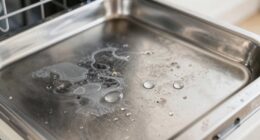Bad-tasting ice often comes from odors and impurities in your freezer or issues with water quality, even when your drinking water seems fine. Ice can absorb strong odors from old food, especially if you haven't cleaned your freezer recently. It's also possible that your water filter is clogged or your tap water has high chlorine levels. Ice makers can malfunction, adding unwanted flavors, or new refrigerators may have manufacturing residues affecting taste. If you want to clear up the mystery, keep exploring the different factors that could be impacting the flavor of your ice.
Key Takeaways
- Ice can absorb odors from old food in the freezer, leading to bad taste despite clean water.
- High mineral content or contaminants in tap water can become concentrated in ice, resulting in off-flavors.
- Clogged or outdated water filters may introduce impurities, affecting ice taste even if the water appears fine.
- Ice makers can malfunction, causing unwanted odors to infiltrate the ice, despite the water quality being acceptable.
- Newly purchased refrigerators may have manufacturing residues that affect the first batches of ice, even if the water is clean.
Old Food Contamination
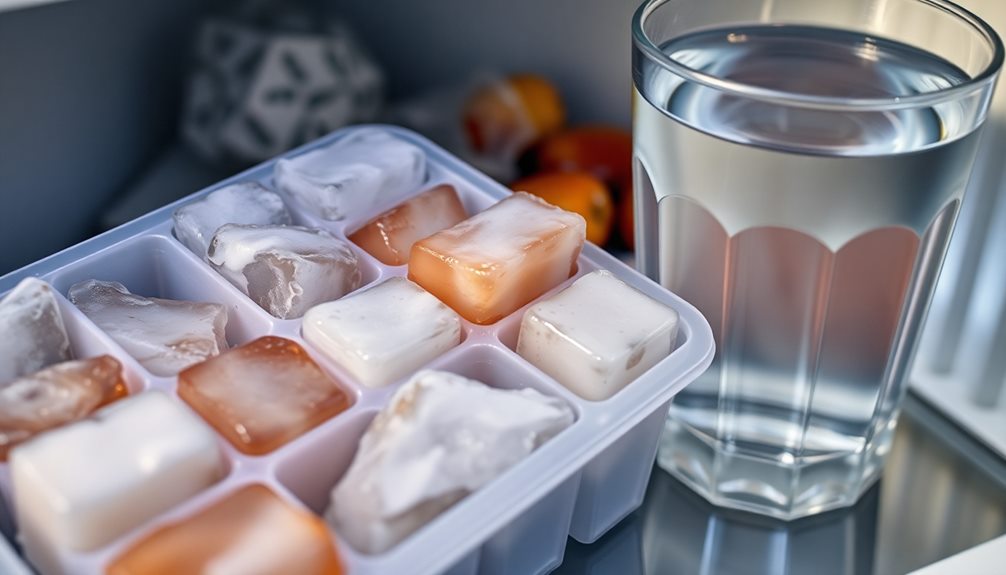
Old food in your freezer can ruin the taste of your ice. When you store ice cubes, they can absorb strong odors from old or poorly stored food items, leading to a bad taste. Foods like onions, garlic, and fish are particularly notorious for transferring their smells, making your ice unappetizing.
Even if the water you use is clean, those potent odors can linger and taint your ice cubes.
To prevent this, you need to store food in airtight containers. This simple step can greatly reduce the risk of odor transfer. It's also a good idea to regularly clean your freezer and dispose of any expired food items.
If you let old food sit too long, it mightn't just ruin your ice; it can also lead to stale-tasting cubes over time.
Make it a habit to clean your freezer at least once a month. By doing so, you can minimize the accumulation of unwanted odors and keep your ice tasting new.
Water Filter Issues

When your ice starts to taste off, water filter issues might be the culprit. A clogged or old water filter can cause impurities to accumulate, leading to bad-tasting ice that may even taste like chemicals.
While your water might seem fine, the filtration system could be failing to remove contaminants effectively. It's vital to replace your water filter every six months to maintain peak performance.
If you notice bad-tasting ice soon after installing a new filter, it might be defective or improperly installed. Checking the user manual for specific instructions can help you verify you're using the correct filter type.
Regular maintenance of your water filter is essential, as an overdue replacement can cause foul smells and tastes in ice production. Old water running through a worn-out filter can contribute to unpleasant flavors, affecting your ice quality.
Freezer Maintenance Neglect

If you neglect regular cleaning of your freezer, frost buildup and food particles can contaminate your ice cubes, leading to bad tastes.
It's crucial to establish a cleaning routine to keep things fresh and prevent unpleasant odors from seeping into your ice.
Regular Cleaning Necessity
Regular cleaning of your freezer is essential to maintaining the quality of your ice. If you neglect this task, food odors can seep into your ice production, leading to unpleasant-tasting ice cubes. To prevent this, make it a habit to clean both your ice maker and ice bin regularly.
For manual defrost models, frequent cleaning and defrosting are vital to avoid odor accumulation. Self-defrosting models should be cleaned thoroughly at least twice a year.
Using warm water and mild dish soap is effective in removing old odors, ensuring your ice stays fresh. Monthly cleaning of your freezer and refrigerator helps combat the absorption of odors from open or poorly wrapped food containers, which can directly affect your ice's taste.
It's also wise to properly seal food containers and dispose of old or unused items to minimize the risk of contamination in your freezer.
Frost Buildup Problems
Frost buildup can quickly become a major issue in your freezer, trapping food particles and odors that contaminate your ice cubes. When frost accumulates, it creates an environment where old food residues linger, leading to unpleasant smells that your ice maker can unknowingly pick up.
If you have a manual freezer, regular defrosting is vital to prevent this buildup. Self-defrosting models also require thorough cleaning at least twice a year to eliminate any remnants that could cause odor transfer to your ice.
Neglecting proper freezer maintenance allows these odors from spoiled food to seep into your ice maker, resulting in bad-tasting ice, even if your water quality is perfectly fine. To combat this issue, make a habit of cleaning your freezer using warm water and mild dish soap, which can effectively remove frost and debris.
By doing so, you guarantee your ice maker operates without contamination, preserving the taste of your ice. Remember, proper maintenance not only enhances ice quality but also boosts your freezer's overall performance.
Don't let frost buildup ruin your drinks—stay proactive about cleaning!
New Refrigerator Residues
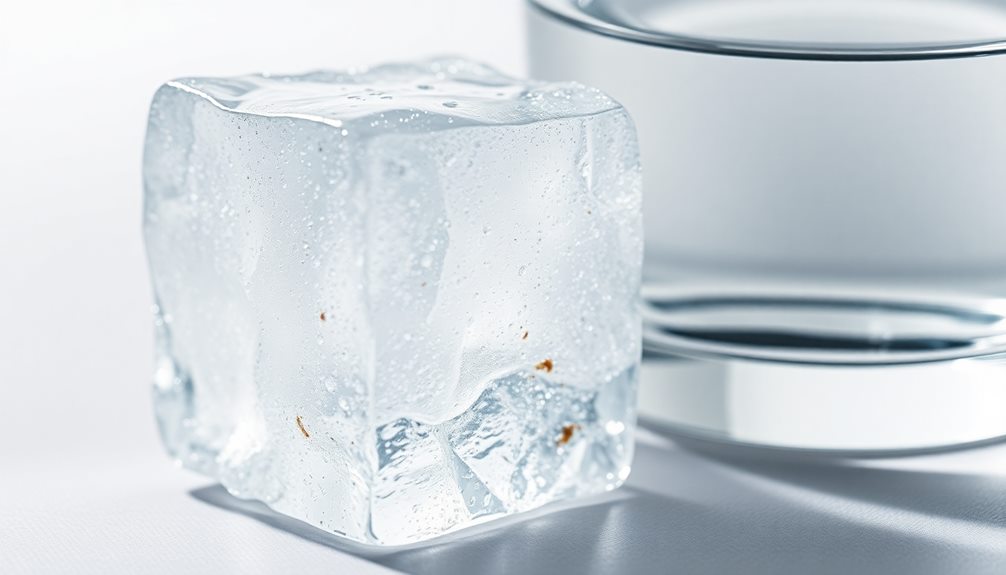
When you get a new refrigerator, it might've some manufacturing residues that can affect the taste of your ice.
To avoid that chemical flavor, it's best to discard the first few batches and give the materials some time to settle.
This way, you can enjoy fresh-tasting ice without any weird aftertastes.
Manufacturing Residue Effects
Although a new refrigerator can enhance your kitchen, it may also introduce unwanted flavors to your ice due to manufacturing residues. These residues, which include chemicals from plastics and metals, can affect the taste of ice while leaving your water supply unaffected.
Here are some key points to reflect on:
- Initial Ice Quality: The first batches of ice from the ice maker may carry off-flavors from manufacturing.
- Dissipation Over Time: These undesirable tastes typically lessen after several cycles of ice production.
- Pre-Use Preparation: Allowing the refrigerator to run for a few days can help settle materials and reduce chemical taste.
- Ice Batches to Discard: It's advisable to discard the first few batches of ice after installation to eliminate residual tastes.
- Regular Maintenance: Keeping your ice maker clean and well-maintained further mitigates lingering flavors from manufacturing residues.
Initial Ice Discard
It's common for new refrigerators to produce ice with off-flavors due to manufacturing residues. When you first start using your ice maker, the initial ice discard is essential. Those first few batches can carry a bad taste from chemicals present in plastic or metal components.
Since water freezes and concentrates impurities, any residual flavors are often more pronounced in the frozen state. To improve your ice quality, it's recommended to discard the initial ice produced. This simple step will help eliminate any unpleasant tastes that could affect your drinks and food.
After you've discarded that initial batch, continue using the ice maker regularly. This ongoing use can further clear out any lingering manufacturing residues, resulting in more invigorating-tasting ice over time.
Additionally, if your refrigerator has a water filter, make sure to change it every six months or as recommended. A clean water filter can also contribute to better ice quality, ensuring that any bad tastes are minimized.
Settling Time Required
Settling time is essential for improving the taste of ice produced by a new refrigerator. When you first install your fridge, it can contain manufacturing residues, like plastic or metal, which may cause your ice to taste bad. By allowing adequate settling time, you can enhance the quality of the ice your ice maker produces.
Here are a few key points to take into account:
- Initial batches: Discard the first few batches of ice; they often carry the residual tastes.
- Time matters: Give your refrigerator time to settle before regular use to eliminate lingering odors.
- Quality improvement: The ice produced after settling will likely taste much better than the initial batches.
- Regular cleaning: Clean your ice maker and bin after the settling period to maintain ice quality.
- Taste discrepancy: Remember that while water might taste fine, refrigerator ice tastes bad initially due to these residues.
Poor Water Quality

Poor water quality can greatly impact the taste of your ice cubes. If you're using tap water with high mineral content or contaminants, it can lead to bad-tasting ice.
When your ice maker produces cubes, it freezes the water, but ice can absorb impurities and odors from that water. This means any unpleasant tastes present in the liquid get concentrated in the ice.
Additionally, using eco-friendly practices to guarantee your water supply is clean can enhance the overall quality of the ice produced. For instance, if your water supply has high levels of chlorine or other chemicals used for disinfection, you might notice a distinct taste in your ice.
Even if your water tastes fine, the contaminants can still affect the flavor of your ice. Testing your water supply can help identify specific impurities or hardness levels that might be impacting the quality of your ice.
To improve the taste of both your water and ice, consider installing a home water filtration system. This can greatly reduce unwanted contaminants and enhance the overall flavor.
Plumbing Problems

Water quality isn't the only factor that can ruin the taste of your ice; plumbing problems can also play a significant role. If you find your ice has a strange taste while your water remains unaffected, there could be issues with your plumbing system. Here are some key points to contemplate:
– Degrading plumbing materials: Old pipes made of copper or PVC can leach metallic or plastic tastes into your ice.
In addition, the presence of contaminants can be linked to outdated plumbing systems, much like how home security system costs can escalate due to improper installations.
- Contaminants: Poor installations or aging pipes may introduce contaminants that alter the flavor of your ice.
- Water supply issues: A bad taste in ice could indicate a problem with the water supply pipes that needs inspection.
- Regular maintenance: Keeping up with plumbing checks guarantees pipes remain intact and free from corrosion, preventing unpleasant tastes.
- Professional help: Consulting a plumber can identify and resolve plumbing-related problems affecting your ice quality.
Stale Ice Cubes
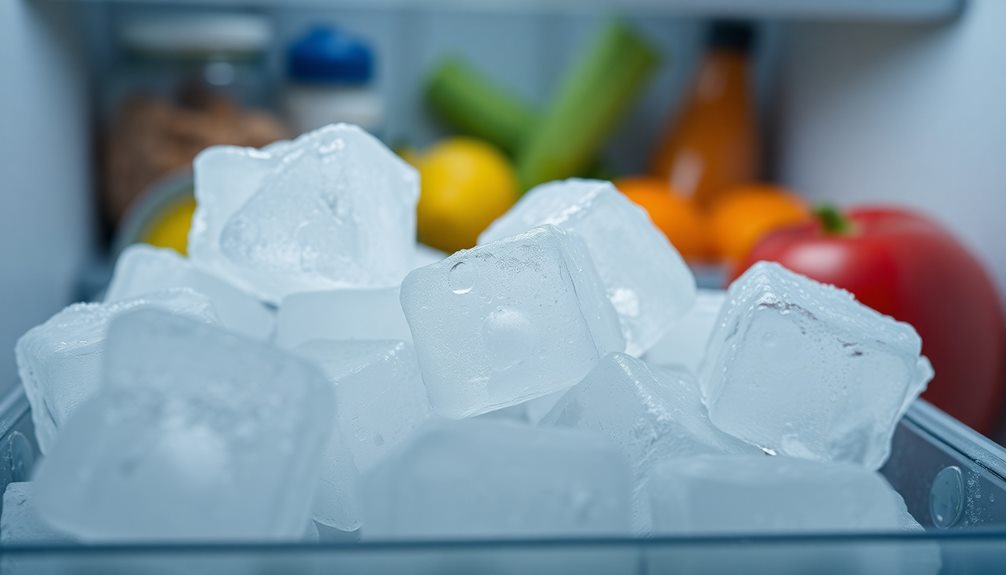
Stale ice cubes often develop an unpleasant taste or odor if they sit unused for too long, usually more than a week. This stale ice can absorb odors from nearby food particles in the ice bin or the freezer itself, leading to a mildew smell that negatively impacts the quality of your drinks.
To keep your ice tasting new, consider the following:
| Issue | Solution |
|---|---|
| Stale Ice | Dispose of old ice cubes |
| Odor Absorption | Clean the ice bin regularly |
| Discoloration | Check for clarity in ice cubes |
| Prolonged Storage | Seal remaining ice in bags |
| Infrequent Use | Turn off the ice maker when not in use |
Ice maker ice can become stale quickly if it's not consumed. When you notice that your water tastes fine but your ice doesn't, it's time to assess the age and condition of your ice. Regularly renewing your ice supply will guarantee you have clean, crisp cubes ready for your beverages. Keeping your ice bin clean is essential for maintaining ice quality and preventing any off-putting flavors.
Ice Maker Malfunctions
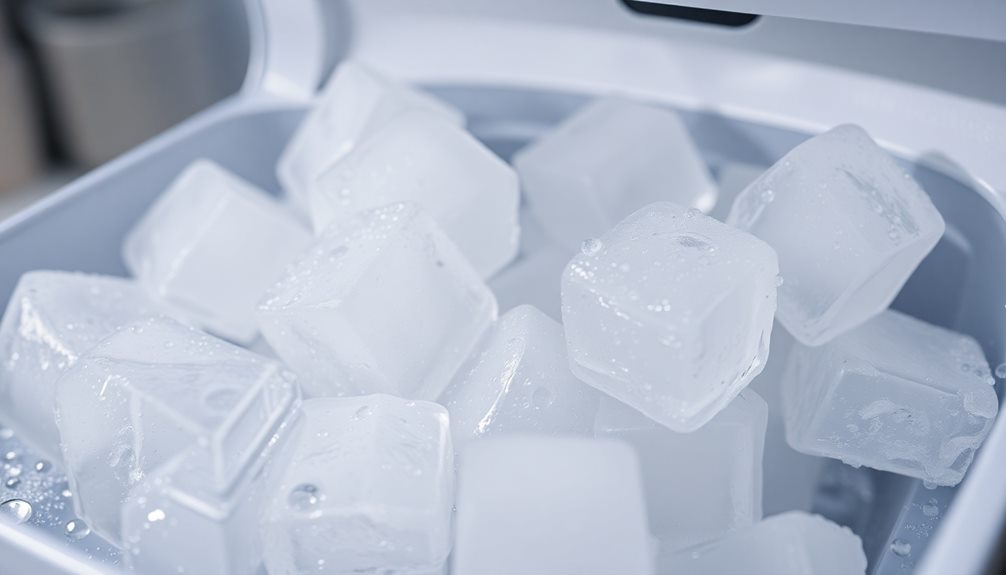
When your ice maker malfunctions, it can lead to unpleasant-tasting ice that ruins your favorite drinks. Issues like a failing motor or fan can introduce unwanted odors into your ice. Since these components continuously circulate air, they might contaminate the ice with odors that impact its taste.
Regular maintenance of your ice maker is essential, as indoor air quality can be affected by how well it functions. To guarantee you're enjoying fresh ice and water, keep an eye on your ice maker's performance.
Here are some signs of potential malfunctions:
- Unusual noises coming from the ice maker
- Ice cubes with strange odors
- Reduced ice production
- Water pooling in the ice compartment
- Inconsistent ice texture
If you notice any of these signs, it might be time for some ice maker repair. Regular maintenance can help, but if the problem persists, consider replacing parts that are available online.
Consulting a professional technician is also a wise option for thorough inspection and peak performance. Remember, good-tasting ice and water start with a properly functioning ice maker, so don't hesitate to address any issues as they arise!
Chemical Taste in Ice
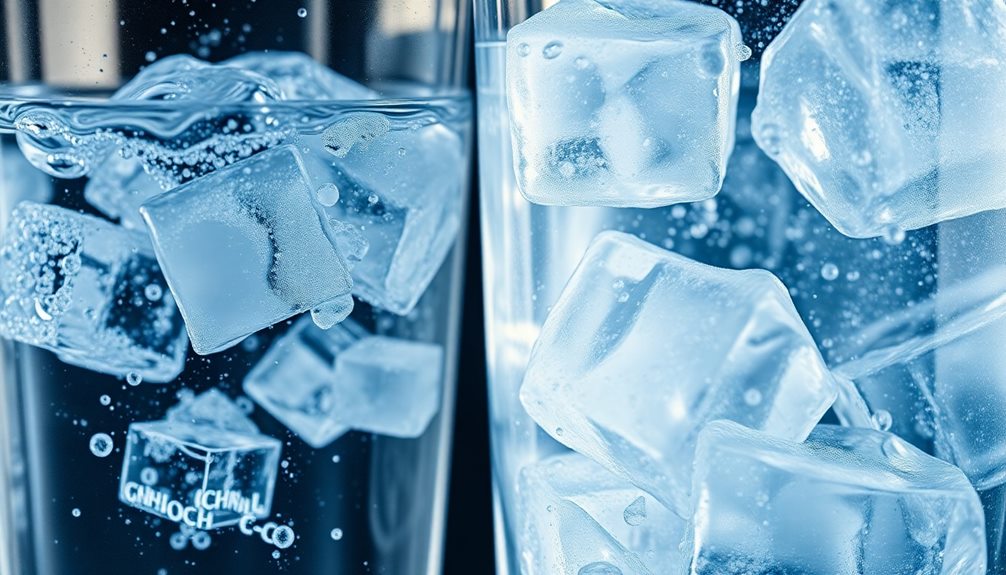
The unpleasant chemical taste in your ice can often stem from the chlorine and other disinfectants found in tap water, which become more pronounced as the water freezes. When you use unfiltered water for ice production, these chemicals can alter the flavor, making your ice taste distinctly different from the clear, pure taste of the water itself.
Additionally, the materials used in your ice maker can contribute to this issue. Certain plastics and metals may leach chemicals, particularly if your ice maker is new or not designed for food safety.
Regular maintenance is essential; cleaning your ice maker helps remove any buildup or residues that could affect the flavor of your ice.
If your ice maker isn't properly sealed, it can also allow odors and chemicals from the freezer to infiltrate the ice, further enhancing the chemical taste in ice.
Frequently Asked Questions
Why Does My Ice Taste Bad but Not My Water?
Your ice might taste bad due to odors absorbed from the freezer, stale cubes, or a clogged filter. The water, however, remains unaffected if it's fresh and hasn't absorbed any unwanted flavors. Check your ice maker!
How Do You Get Rid of Bad Tasting Ice?
To get rid of bad tasting ice, clean your ice maker regularly, use filtered water, dispose of old ice weekly, replace the water filter, and seal food in the freezer to prevent odor transfer.
Why Do My Ice Cubes Taste Weird?
Your ice cubes might taste weird because they absorb odors from your freezer, come from a clogged filter, or have been stored too long. Regular cleaning and proper sealing can help improve their taste considerably.
Why Does My Ice Taste Bad Even With a New Filter?
Your ice might taste bad even with a new filter because the ice maker itself can harbor odors or contaminants. Regular cleaning and maintenance are essential to guarantee the ice remains fresh and free from unwanted tastes.
Conclusion
So, it turns out your ice might be the diva of your kitchen, demanding attention while your water quietly sips away unnoticed. Who knew that a simple cube could harbor the secrets of contamination or plumbing woes? Maybe your ice maker's just trying to keep things interesting, or perhaps it's taken a liking to the old leftovers lurking in the freezer. Whatever the reason, it's clear: sometimes, it's the ice that needs a makeover, not the water!









